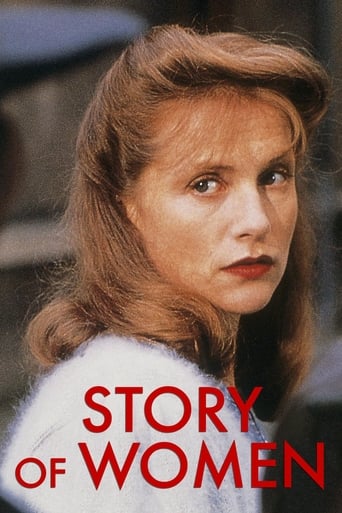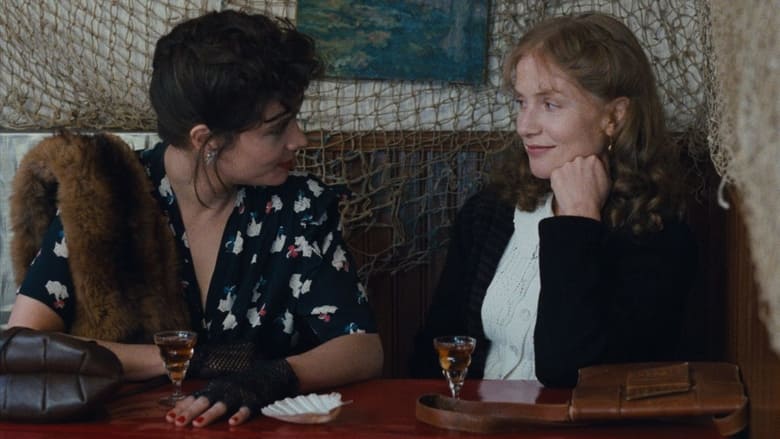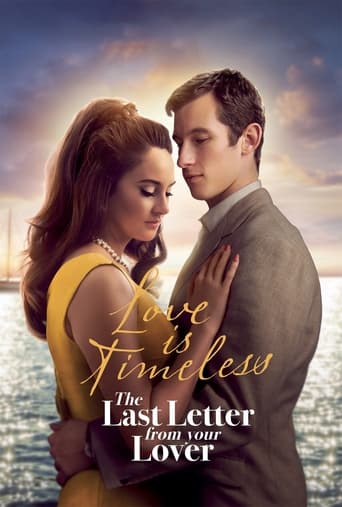

Story of Women (1988)
France, World War II. In order to somehow make ends meet, the mother of two children, Marie Latour, does underground abortions and rents a room to a familiar prostitute. She doesn't pay any attention to her husband, who returned from the war because of his injury and lives her own life. Abortions gradually begin to bring a good income, and boredom can be easily dispelled by starting a young lover.
Watch Trailer
Cast


Similar titles
Reviews
Touches You
Sorry, this movie sucks
Please don't spend money on this.
It's entirely possible that sending the audience out feeling lousy was intentional
As a great admirer of Chabrol's 'Helene cycle' of the late 60's and early 70's I approached this film with some trepidation, having been disappointed by some of his more recent work.However I was pleasantly surprised, the film was nicely scripted and acted, period detail good and the whole felt taut and unsentimental. A previous reviewer seems surprised that Chabrol remains balanced in his views,however Chabrol often refuses to take sides and allows the viewer a freedom (almost unknown in moralising modern films)to make up their own mind. One only has to view the excellent 'Nada' to appreciate this.I thought Isabelle Huppert was better here than in any other role i've seen her, partly because she managed to drop the somewhat smug persona she seems to bring to her roles. (yes i'm not a fan and wish Chabrol would turn his attention elsewhere). She played the central character as both cynical and devious, charmingly naive vindictive and finally empty and self loathing. A real acting masterclass.Much as I enjoyed this film though it left me rather empty at the end, indeed there really was little I cared about, both in terms of character and plot. All the usual questions one feels need answering were absent, the curious unease and ambiguity gone. The Chabrol appeared to be absent from this nevertheless efficient and entertaining Claude Chabrol film.
Though I had owned this on VHS (recorded off French TV), I only opted to check it out now – after acquiring the film in a version accompanied by English subtitles, on the occasion of its director's birthday. While not a typical effort (being a period melodrama and based on fact to boot), in retrospect, it is justly considered among Chabrol's finest.Star Isabelle Huppert (in one of her best performances, playing an essentially unsympathetic if pitiable type) received the Best Actress award at the Venice Film Festival for her work here. Interestingly, I would 'meet' Chabrol there in 2004 where the winning film that year happened to deal with the exact same subject as STORY OF WOMEN – the controversy regarding the practice of abortion, i.e. Mike Leigh's VERA DRAKE! Co-star Francois Cluzet, who acts pretty much as second-fiddle to Huppert in this case, would eventually come into his own under Chabrol's guidance in the similarly excellent L'ENFER (1994). The film, however, also provides a notable showcase for Marie Trintignant in the role of Huppert's prostitute friend; again, the actress would subsequently be promoted to lead status for the same director's BETTY (1992), which I have just watched and reviewed.STORY OF WOMEN, then, makes for compelling viewing in several different keys: as a character study (Huppert wants to be a singer, refuses to sleep with her ex-P.O.W. husband but then takes a much younger lover, of course offers her services to girls 'in trouble' and ultimately renounces her faith while in prison), as a look at war-torn France (though the Nazis are hardly ever in the foreground, the hardships endured by the locals obviously have a lot to do with how they are 'forced' to behave) and as a critique, in the vein of Costa-Gavras' movies, of the justice system (there is no doubt Huppert was at fault but the punishment meted out, to set an example and uphold the country's moral rectitude to counter the dishonor of occupation, was too extreme). Oddly enough, once the husband exposes her to the authorities for rather selfish reasons to begin with, he basically exits the picture and is never shown feeling any kind of remorse.For the record, Chabrol had already treated a cause célèbre in VIOLETTE NOZIERE (1978; which I will get to soon in my ongoing marathon, since I am actually approaching it in reverse chronological order!) and would do so again in the recent A GIRL CUT IN TWO (2007; that I have already viewed and commented upon).
I'd like to focus on this film as a French film, not of the United States. If one has seen "La Chagrin et la Pitie," then one knows the legacy of this film. France was not perfect during WWII. Not everyone in France was part of the resistance, mainly, they were trying to survive. I think its an amazing film that sheds light on a crucial point in French history. Yes, it's about abortion and Chabrol does a great job ensuring his abortionist is less than perfect. That's a wonderful point he makes, that no one is perfect, not even the moral majority of the government. But, I come away from this film with the same questions that I get from "Lacombe, Lucien," which are: 'what would I have done?' And, please, don't Monday morning quarterback World War II.
Claude Charbrol's stark and unsentimental masterpiece about the last woman to be executed in France--she was guillotined for performing abortions in Nazi-occupied France during World War II--forces us to see a side of war not often depicted. What does a woman with two little children do when her country is occupied by the brute forces of the enemy? How is she to find enough to eat, to buy the increasingly scarce and costly necessities of life? How is she to find joy in life? Women often turn to prostitution during such times, but Maire Latour does not. Instead she aborts the foetuses of the prostitutes and of other women impregnated, often by the Nazis. In a sense this is her "resistence." However she prospers and takes up with a Nazi collaborator. In the process she reduces her husband to frustration and humiliation.Isabelle Huppert as Marie Latour is mesmerizing in a role that allows her talent full latitude. She is clear-headed and sly as a business woman, warm and ordinary as a mother, cold and brutal as a wife, childish and careless as an adulteress, resourceful and fearless as an abortionist, and unrepentant as she awaits the executioner (foreshadowed, by the way, by her son, who wants to be an executioner when he grows up). Francois Cluzet plays her husband Paul, and he is also very good, especially at rousing our pity. Charbrol makes it clear that both Marie and Paul are victims, not only of war, but of their divergent natures. Paul wants the love of Marie, but she wants only a man that represents success and power, a man who is clean-shaven, not the menial worker that he is. Marie Trintignant is interesting and convincing as a prostitute who becomes Marie Latour's friend and business associate.While abortion is indeed "Une affaire de femmes" this film is about much more than that. No doubt the title is there to emphasize Charbrol's point that men really do not (did not then, and do not now) really understand abortion and why it is sometimes a horrible and abject necessity. When Marie is taken to Paris for a show trial she exclaims to a woman in jail with her, referring to the court that will pass judgment on her, "It's all men...how could men understand?" We can see that men really can't, and that precisely is what this movie is all about: showing us just how horrible pregnancy can be under the circumstances of enemy occupation.A secondary story here, not quite a subplot, is Paul's story. What does a man do when he and his children are dependent on a woman who doesn't love him, a woman who rejects him and even goes so far as to arrange for the cleaning woman to sleep with him? It is not only Marie who humiliates him, but it is the defeat of his country, the easy surrender to the Nazis that has so reduced him. This is made clear in a scene late in the film between two lawyers who voice their shame as Frenchmen in a time of defeat.What Paul does is not pretty (and I won't reveal it here), but so great is the provocation that one understands his behavior and can forgive him.(Note: Over 500 of my movie reviews are now available in my book "Cut to the Chaise Lounge or I Can't Believe I Swallowed the Remote!" Get it at Amazon!)














